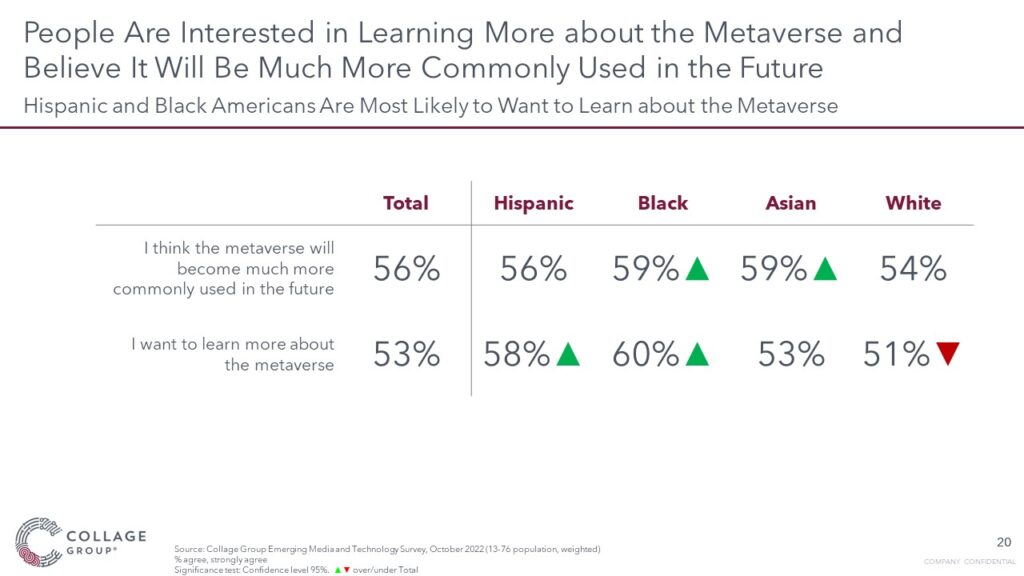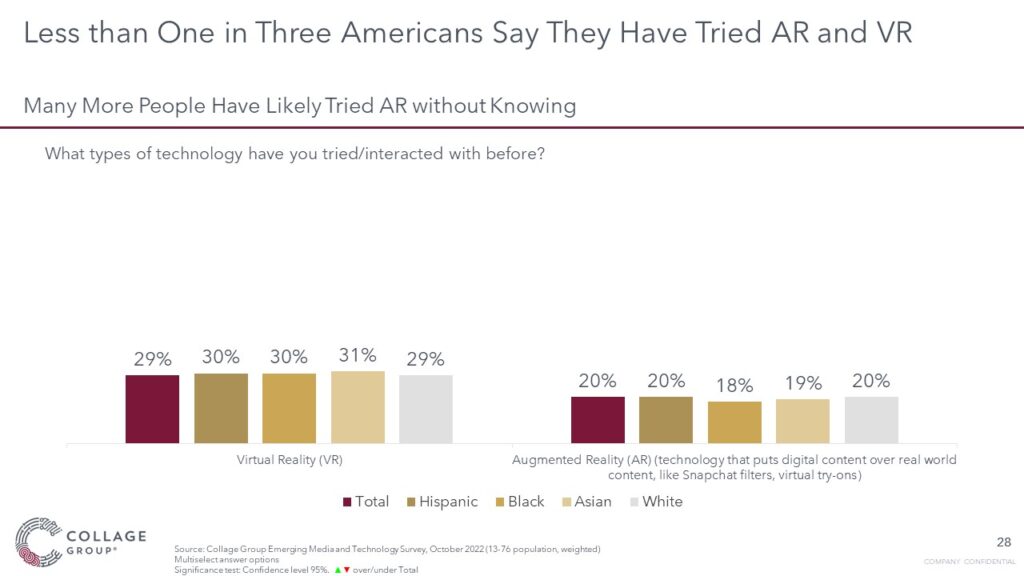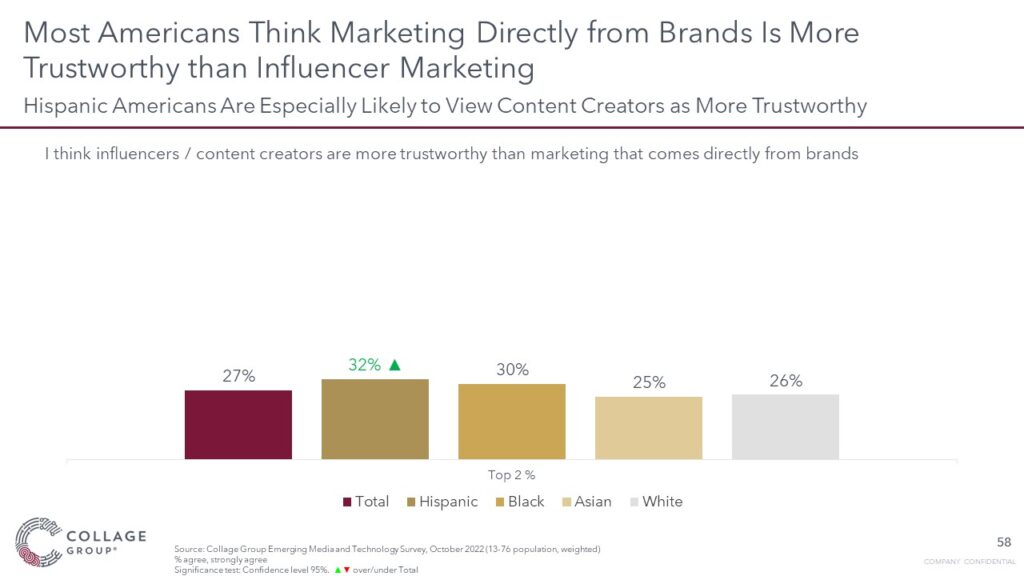Metaverse, TikTok, AR – Best Practices for Engaging Diverse Consumers in Media

Learn how Americans across races, ethnicities, and generations engage with emerging technology and media, including the metaverse, AR, VR, emerging social media platforms, and influencers.
Media is a major aspect of consumers’ everyday lives, and today’s media landscape is always changing. Technologies like the metaverse, augmented reality, and virtual reality, along with emerging trends in social media like influencer marketing, have the potential to change people’s everyday lives. For brands and advertisers across industries to succeed, they need to understand how people feel about these new technologies, their current usage rates, and if they are interested in using them in the future.
Fill out the form for an excerpt from our Best Practices for Engaging Diverse Consumers in Media presentation.
Collage Group’s 2022 study on emerging media provides insights across races, ethnicities, and generations on Americans’ behaviors around the metaverse, AR, VR, wearable smart devices, and NFTs. It also looks at newer and emerging social media platforms like TikTok and BeReal, and the power of influencer marketing.
Key Findings: The Metaverse
- Millennials, alongside Hispanic and Black Americans are more likely to have tried the metaverse and to believe it is for people like them.
- 1 in 2 Americans want to learn more about the metaverse and they want brands to play a role in that education. This desire is particularly strong for Black Americans.
- Entertainment is the most popular reason Americans are interested in the metaverse today. This is particularly true for Black and Hispanic Americans.

Context:
Millennial and Multicultural Americans, particularly Hispanic Americans, are keen to try new technologies as soon as they come out. For Millennials, they have grown up in an era of new tech adoption and now have relatively more resources to buy in to the new tech. Multicultural Americans often turn to technology to explore the world and their own culture, as well as the culture of others.
Many Americans expect brands to be more than just the products and services they offer. Black Americans especially want brands to step up on a host of issues. The lack of clarity still surrounding the metaverse makes it an important opportunity for brands to play a guiding role.
Entertainment holds the key to consumers’ current use (video games, digital concerts, experiences, etc.) and future appeal. Since the metaverse is still in an experimental development phase, entertainment is the most compelling reason for consumers to give the tech a try.
Action Steps:
- Develop your metaverse marketing strategy with early adopters – Millennial and multicultural consumers- in mind.
- During this early phase of the metaverse, take steps to educate consumers about this emerging technology. This can include specific information on what is and isn’t considered the metaverse, the promise the technology holds, and what consumers can expect from your brand on the metaverse.
- When connecting with Americans on the metaverse, prioritize entertainment experiences. Sponsoring a concert or sports game on the metaverse will be a way to tap into the many Americans who want to use the platform for these experiences.
Key Findings: AR, VR, and Wearable Devices
- Americans are still not using AR or VR technology at high rates, although many are likely using AR without knowing it.
- Asian and Hispanic Americans are most likely to use wearable devices. Health and fitness is the leading reason to use these devices, particularly for Asian Americans.

Context:
Many Americans may be unaware that they have used AR in their everyday life because they don’t relate the experience they had with the label of AR. As a result, the concept of “augmented reality” doesn’t have as much traction with consumers as the specific uses and platforms do.
Multicultural Americans, particularly Hispanic and Asian, have a strong passion for fitness. They are more likely to enjoy working out and a wearable device such as an Apple Watch or Fitbit allows them to stay connected to their fitness goals. But, while many Americans use their wearable for fitness, they are also glancing at their wearable throughout the day.
Action Steps:
- Don’t get caught up in labeling the technology your brand offers. Many are enjoying the experience they are getting from this technology, even if they don’t use the terminology.
- Make marketing “glanceable” so that emails and newsfeeds can work in the small screen of the wearable as well.
Key Findings: Social Media and Influencers
- Short content is the star of social media platforms, and that is especially true for TikTok. Americans lean into short videos whether they are on TikTok for just a few minutes or way longer.
- While most Americans think that marketing coming directly from brands is more trustworthy than an influencer, they also find influencers and content creators to be trustworthy sources of information.

Context:
TikTok is known for its “snackable” content, and the desire for Americans to see shorter videos aligns with why this platform became so popular to begin with. Shorter content gives viewers control over how much they watch. Even if they end up watching many videos, it still feels more manageable than committing to one, longer piece of content.
Consumers are savvy about influencer marketing, and partnerships with influencers who are transparent and trustworthy will feel more authentic to them. People don’t expect an absence of advertising on social media, but they do prefer it to be clearly identified as such.
Action Steps:
- When advertising on TikTok, keep it “snackable” and deliver videos less than one minute in length.
- When partnering with a content creator on social media, select those that are authentic and trustworthy including offering transparency and honesty in their decisions and potentially going out of their way to combat misinformation.
This blog includes a small sample of the deep cultural intelligence available to our members. Contact us to learn how you can unlock full access to our cultural intelligence engine.